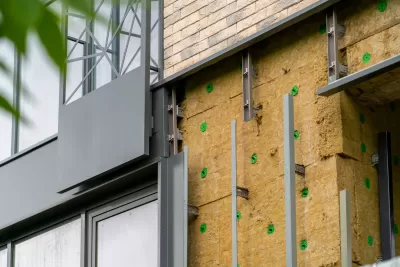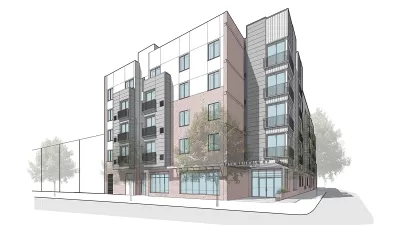Developers in Chicago and around the country are taking notice of a design standard that encourages energy efficiency and sustainable materials.

Multi-family housing developers in Chicago are embracing Passive House design standards to lower their carbon footprints and reduce costs. As Lizzie Kane reports in the Chicago Tribune, “Multifamily developers, particularly those building affordable housing, in Chicago have begun to embrace Passive House design in the last few years thanks to local industry professionals advocating for changes in the city and state building energy codes, as well as buy-in from ComEd, the primary energy provider in the state.”
“Passive House design focuses on making a building tightly sealed by including features such as triple-paned windows and wraparound insulation to keep outside temperatures from creeping in (and noise too), as well as ventilation systems to keep air quality fresh,” Kane explains.
The Passive House standard, originally geared toward single-family homes, is being implemented on around 275 multi-family projects nationwide, according to a study from the Passive House Network. “The study said in order to speed up the pace of Passive House development, local, state and federal policymakers should finance incentive programs, offer professional training, increase provisions in state affordable housing programs and amend compliance rules in energy codes.” Passive House was recently added to Chicago’s Sustainable Development Policy and the city’s building code.
Kane describes other city and state policies in the works that will incentivize the Passive House standard and make it easier to build low-impact, efficient buildings at lower cost. Outside of Illinois, “Massachusetts, New York, Pennsylvania and Connecticut lead the way in multifamily buildings being developed to meet the Passive House standard, with each state having more than 50 properties in the pipeline or already completed, according to Phius’ database.”
FULL STORY: Passive House design is coming to Chicago’s multifamily housing industry

Alabama: Trump Terminates Settlements for Black Communities Harmed By Raw Sewage
Trump deemed the landmark civil rights agreement “illegal DEI and environmental justice policy.”

Planetizen Federal Action Tracker
A weekly monitor of how Trump’s orders and actions are impacting planners and planning in America.

The 120 Year Old Tiny Home Villages That Sheltered San Francisco’s Earthquake Refugees
More than a century ago, San Francisco mobilized to house thousands of residents displaced by the 1906 earthquake. Could their strategy offer a model for the present?

Ken Jennings Launches Transit Web Series
The Jeopardy champ wants you to ride public transit.

BLM To Rescind Public Lands Rule
The change will downgrade conservation, once again putting federal land at risk for mining and other extractive uses.

Indy Neighborhood Group Builds Temporary Multi-Use Path
Community members, aided in part by funding from the city, repurposed a vehicle lane to create a protected bike and pedestrian path for the summer season.
Urban Design for Planners 1: Software Tools
This six-course series explores essential urban design concepts using open source software and equips planners with the tools they need to participate fully in the urban design process.
Planning for Universal Design
Learn the tools for implementing Universal Design in planning regulations.
Clanton & Associates, Inc.
Jessamine County Fiscal Court
Institute for Housing and Urban Development Studies (IHS)
City of Grandview
Harvard GSD Executive Education
Toledo-Lucas County Plan Commissions
Salt Lake City
NYU Wagner Graduate School of Public Service





























